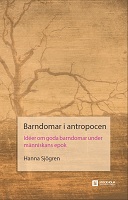Barndomar i antropocen
Idéer om goda barndomar under människans epok
Abstract
Children live with greater risks than adults of being affected by climate change and other environmental phenomena. For example, mortality is greater in children affected by malaria and dengue fever, two diseases whose spread is increasing as a result of climate change. This book analyzes different ideas about what constitutes a good childhood during the time period proposed to be named the Anthropocene: the epoch of man. Based on a critical tradition and based on a focus on how the adult world creates desirable childhoods, the author asks the question of which ideal childhoods emerge and which children are given a place in the Anthropocene. Through critical analyses, ideas about childhoods in the Anthropocene as innocent, special and responsible are identified and problematized. The book studies what takes place at the intersection between ideas about childhood and the state of the Anthropocene in three different arenas: political climate activism, educational research aimed at younger children and literature for children aged 6–12 with environmental and climate themes. The author argues for the importance of the role and responsibility of the adult world in the Anthropocene epoch and that children's lives and existence should be the starting point for decision-making and policy for climate and the environment.
The book is aimed at researchers in the fields of childhood sociology, green humanities and pedagogy, as well as students in pedagogy, environmental science and child and youth science.
Keywords
Critical research; Kritisk forskning; Climate change; Klimatförändringar; Anthropocene; Antropocen; Childhood; BarndomDOI
10.16993/bcfISBN
9789176352144, 9789176352168, 9789176352175, 9789176352151Publisher
Stockholm University PressPublisher website
https://www.stockholmuniversitypress.se/Publication date and place
2023Series
Stockholm Studies in Education, 3Classification
Children’s and teenage literature studies: general
Environmental policy and protocols
Sociology: family and relationships
Environmentalist, conservationist and Green organizations


 Download
Download Web Shop
Web Shop